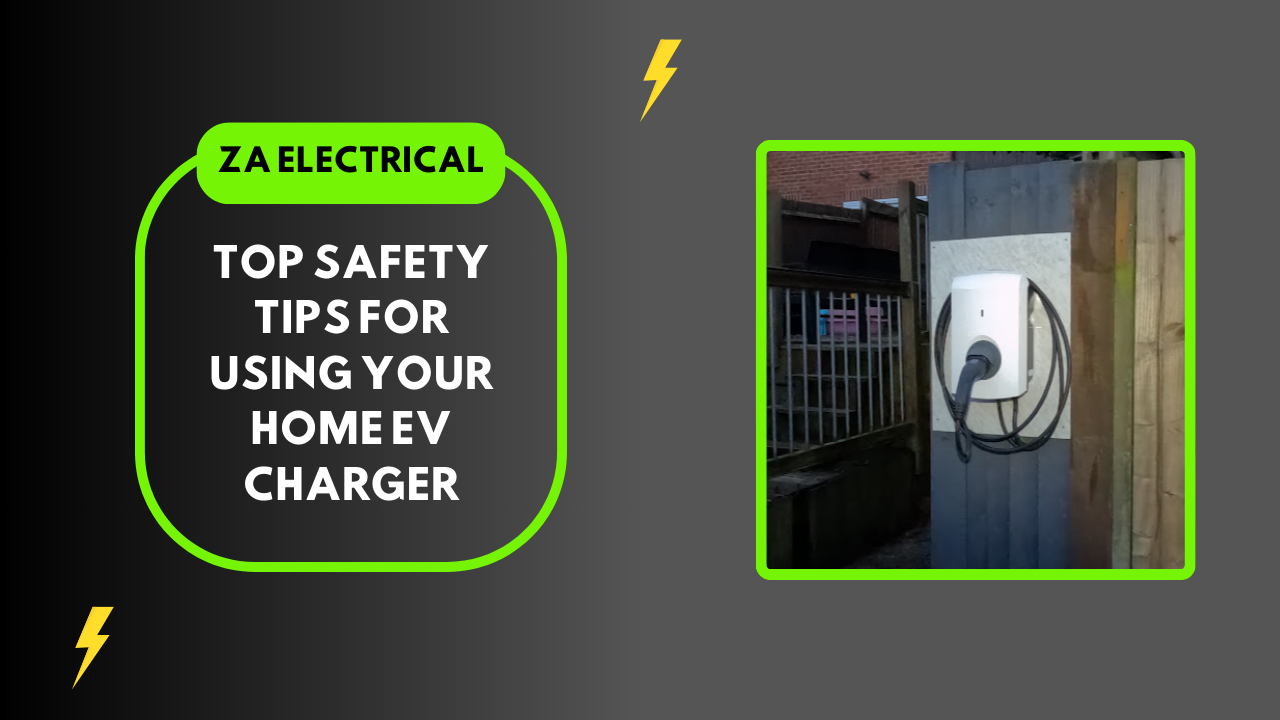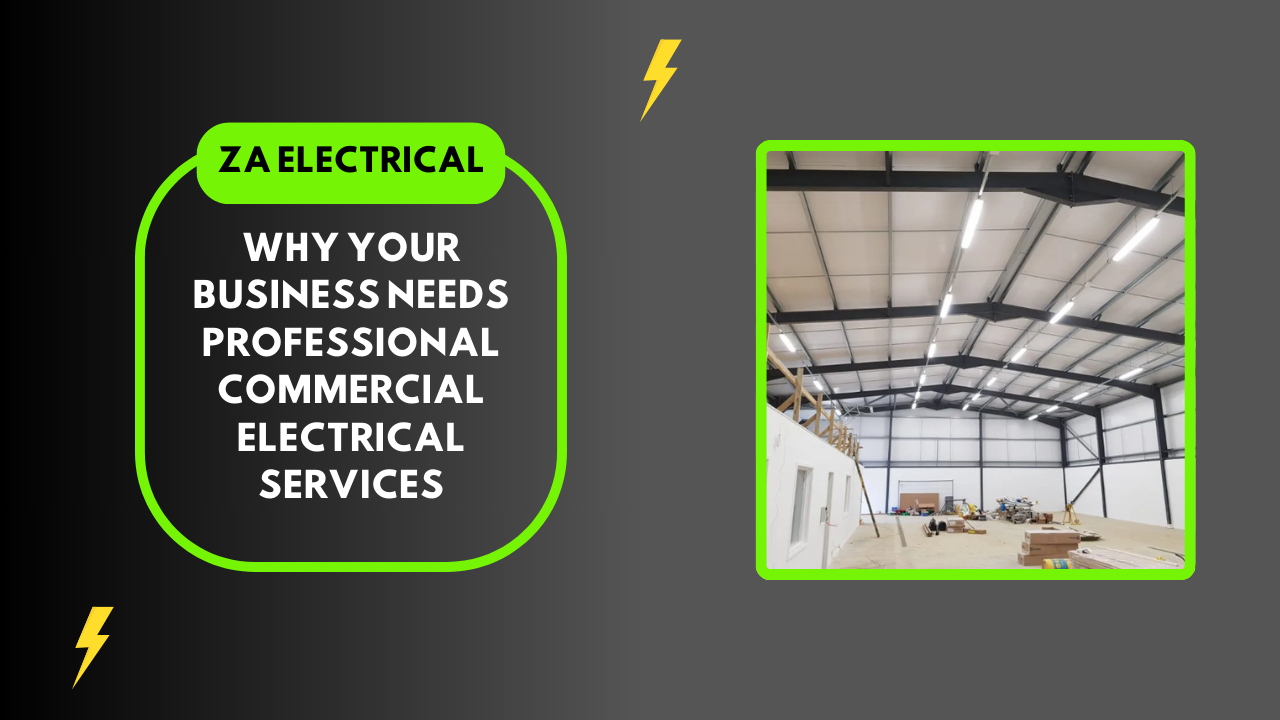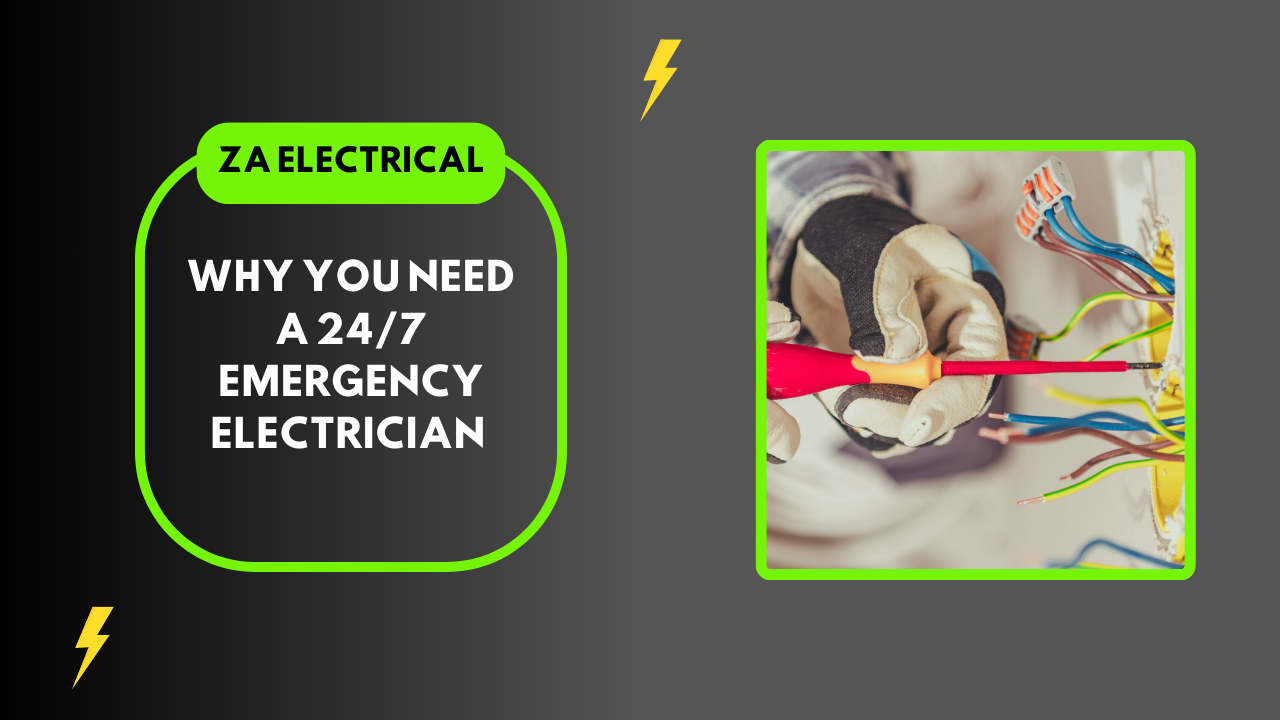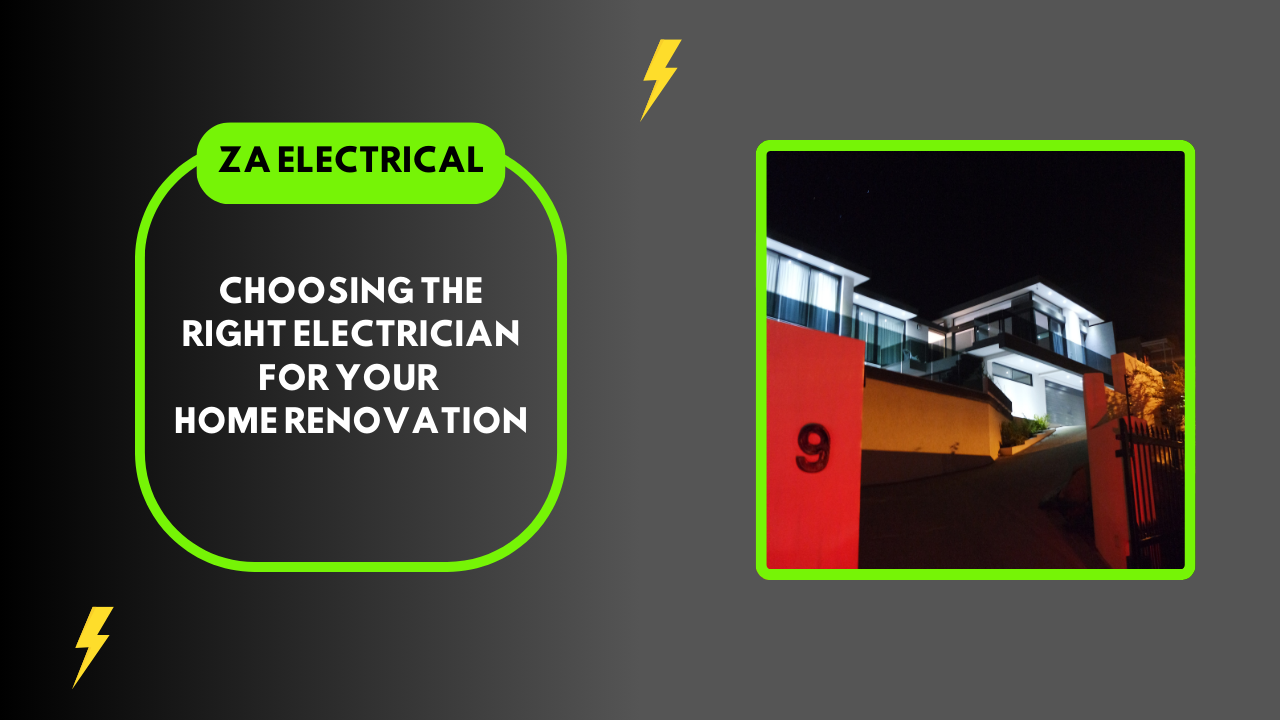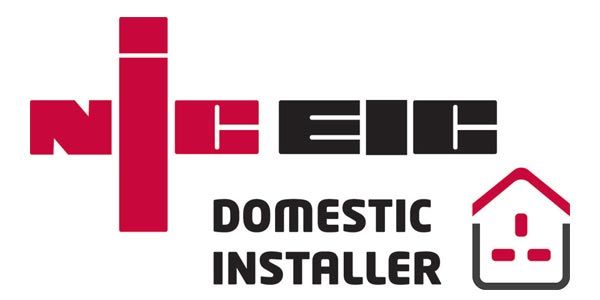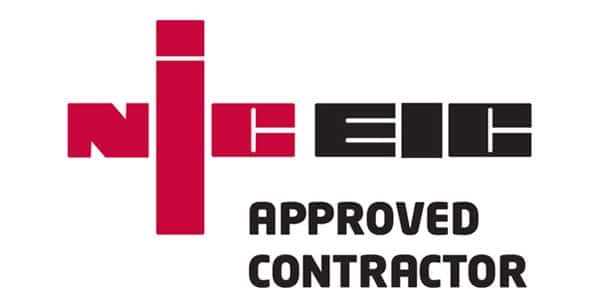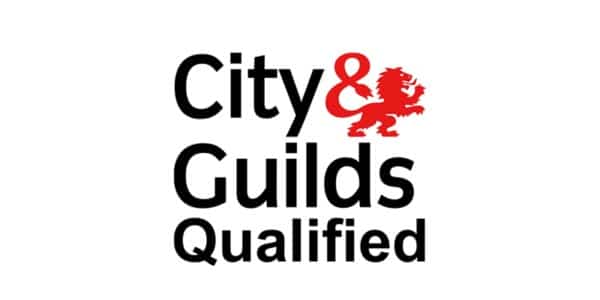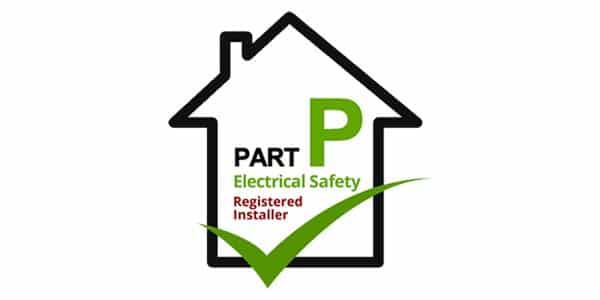Top 5 Electrical Emergencies and How Emergency Electrical Can Help
Top 5 Electrical Emergencies and How Emergency Electrical Can Help
Understanding Electrical Emergencies
Electrical emergencies are often unexpected, disruptive, and dangerous. They can cause significant damage, safety risks, and inconvenience. Whether you’re at home or running a business, it’s essential to know how to handle these situations and whom to call when they arise.
At ZA Electrical, we help homeowners and businesses in Sussex and Brighton. We offer expert electrical services to keep your electrical systems safe and working well. In this blog, we’ll highlight the top 5 electrical emergencies and share tips on how to manage them.
Contact Us
Table of Contents
- Power Outages: Causes and How to Address Them
- Electrical Fires: Prevention and Action
- Electrical Shocks: Safety Protocols and Immediate Steps
- Faulty Wiring: Identifying the Risks and Solutions
- Tripped Circuit Breakers: Causes and Prevention
1. Power Outages: Causes and How to Address Them
A power outage is one of the most common electrical emergencies. It can be caused by various factors, including severe weather, faulty equipment, or overloading of circuits. Regardless of the cause, it is essential to have a plan to address the situation and restore power quickly and safely.
Causes of power outages:
- Weather-related issues: Storms, heavy rainfall, and high winds can cause power lines to fall or short-circuit.
- Overloaded circuits: If too many devices or appliances are plugged into one circuit, it can overload and cause the power to go out.
- Faulty electrical equipment: Damaged wiring or malfunctioning electrical panels can lead to power disruptions.
How to Handle Power Outages:
- Check your breakers: The first step is to check the circuit breaker to see if it has been tripped. If so, switch it back on.
- Use emergency lighting: Keep flashlights, battery-powered lights, and backup generators ready in case of an outage.
- Avoid overloading circuits: Be mindful of the number of appliances and devices you use on one circuit to prevent overloading.
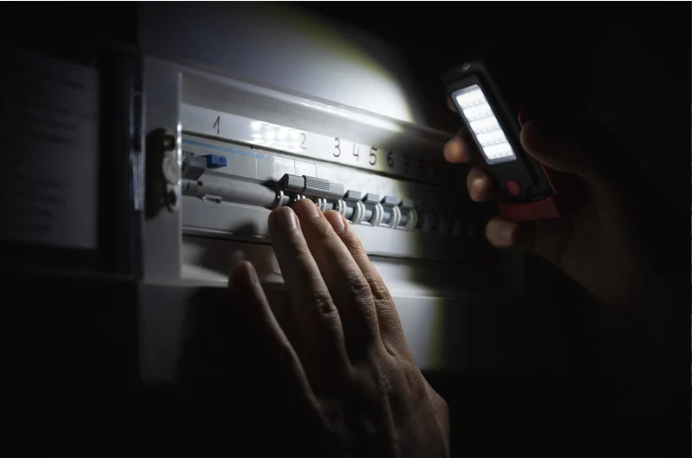
2. Electrical Fires: Prevention and Action
Electrical fires are among the most dangerous and destructive emergencies. They can occur due to faulty wiring, damaged appliances, or overloaded circuits. These fires spread quickly and pose serious risks to your property and health.
Common Causes of Electrical Fires:
- Faulty wiring: Old or damaged wiring is one of the leading causes of electrical fires. Over time, wires can degrade and become a fire hazard.
- Overloaded circuits: Plugging too many devices into a single outlet can lead to overheating and fires.
- Malfunctioning appliances: Old or poorly maintained appliances can overheat and catch fire if they have faulty wiring or are improperly used.
How to Prevent and Respond to Electrical Fires:
- Upgrade old wiring: Regularly inspect and replace outdated or damaged wiring to prevent fire hazards.
- Use certified appliances: Ensure that all appliances are certified and regularly maintained.
- Install smoke alarms: Ensure your home or business is equipped with smoke alarms and that they are in working order.
- Know how to react: In case of an electrical fire, do not use water to put out the fire. Instead, use a fire extinguisher specifically designed for electrical fires (Class C).
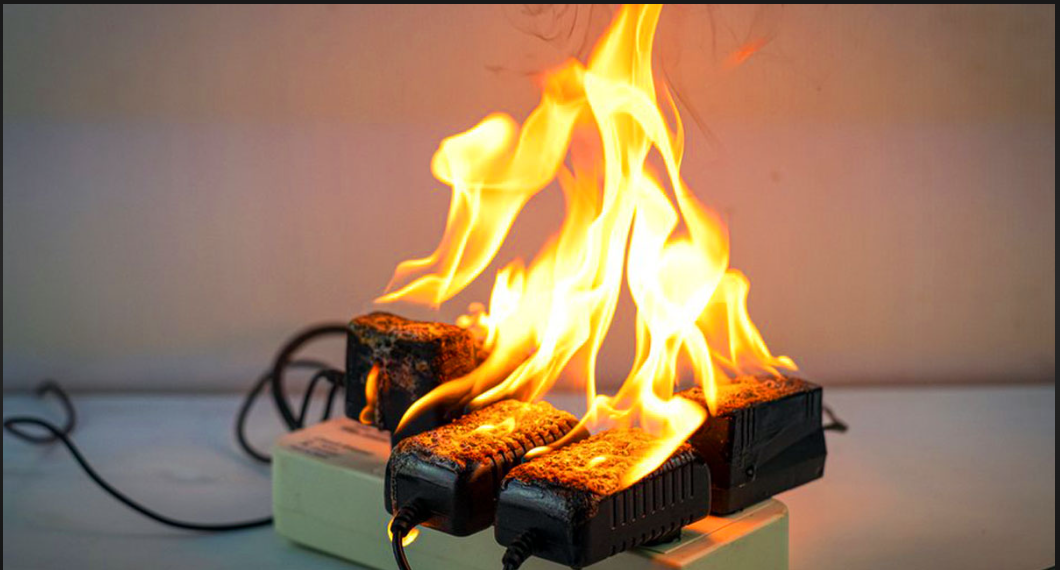
3. Electrical Shocks: Safety Protocols and Immediate Steps
An electrical shock occurs when an electrical current passes through the body. This can range from a mild shock to a life-threatening event. Electrical shocks can happen when you come into contact with faulty wiring, exposed outlets, or malfunctioning appliances.
Common Causes of Electrical Shocks:
- Exposed wiring: Damaged or worn-out wiring can expose live wires, causing electrical shocks when touched.
- Faulty appliances: Using malfunctioning electrical appliances can expose you to the risks of electric shock.
- Wet conditions: Water conducts electricity, and touching electrical outlets or devices with wet hands increases the risk of electric shock.
How to Prevent Electrical Shocks:
- Inspect outlets and wiring: Ensure that all outlets and wiring are in good condition and properly maintained.
- Use GFCIs (Ground Fault Circuit Interrupters): Install GFCIs in areas prone to moisture, such as bathrooms and kitchens, to reduce shock risks.
- Turn off power before handling electrical devices: Always ensure that the power is off before working on or repairing electrical appliances.
What to Do in Case of an Electrical Shock:
- Call for help immediately: If someone is shocked, call the emergency services right away.
- Turn off the power source: If it’s safe to do so, disconnect the power source by unplugging the device or turning off the breaker.
- Administer CPR if necessary: If the person is unresponsive, perform CPR and wait for professional medical help to arrive.
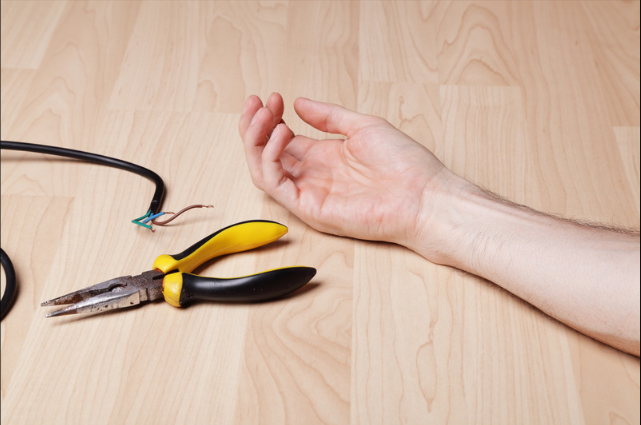
Contact Us
4. Faulty Wiring: Identifying the Risks and Solutions
Faulty wiring is a significant electrical emergency that can lead to various hazards, including short circuits, power outages, and electrical fires. Over time, wiring can degrade due to wear and tear, causing safety risks.
Signs of faulty wiring:
- Flickering lights: If your lights flicker or dim randomly, it may indicate faulty wiring or an overloaded circuit.
- Burning smells or hot outlets: A burning smell or hot outlets can be a sign of faulty or overloaded wiring.
- Tripping circuit breakers: If your circuit breakers trip frequently, it may indicate that your wiring is damaged or improperly connected.
How to Fix Faulty Wiring:
- Call a professional electrician: Faulty wiring requires immediate attention from a certified electrician. Don’t attempt to fix wiring issues yourself.
- Replace old wiring: If your wiring is outdated or damaged, a professional can replace it with modern, safe materials.
- Regular inspections: Schedule regular electrical inspections to identify wiring issues early and prevent more serious problems down the line.
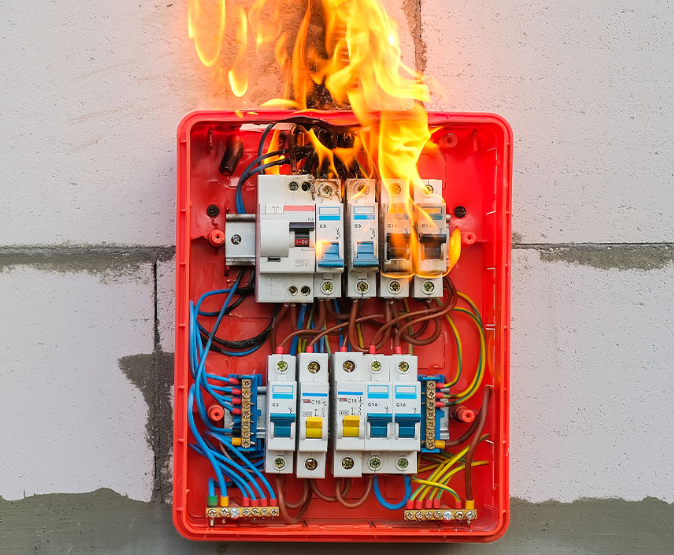
5. Tripped Circuit Breakers: Causes and Prevention
A tripped circuit breaker is a common electrical issue that occurs when a circuit becomes overloaded, short-circuited, or encounters an electrical fault. Circuit breakers are designed to protect your electrical system by cutting off the power to prevent damage.
Common Causes of Tripped Circuit Breakers:
- Overloaded circuits: Plugging in too many appliances into one circuit can overload the system, causing the breaker to trip.
- Short circuits: If two wires come into contact with each other, they can cause a short circuit and trip the breaker.
- Faulty appliances: Malfunctioning electrical appliances can overload circuits and cause breakers to trip
How to Prevent Tripped Circuit Breakers:
- Distribute electrical load: Avoid overloading circuits by spreading your electrical load out across different circuits.
- Inspect and maintain appliances: Ensure that your appliances are in good working order and are not putting unnecessary strain on circuits.
- Upgrade your electrical panel: If your circuit breaker trips frequently, you may need to upgrade your electrical panel to handle higher power demands.
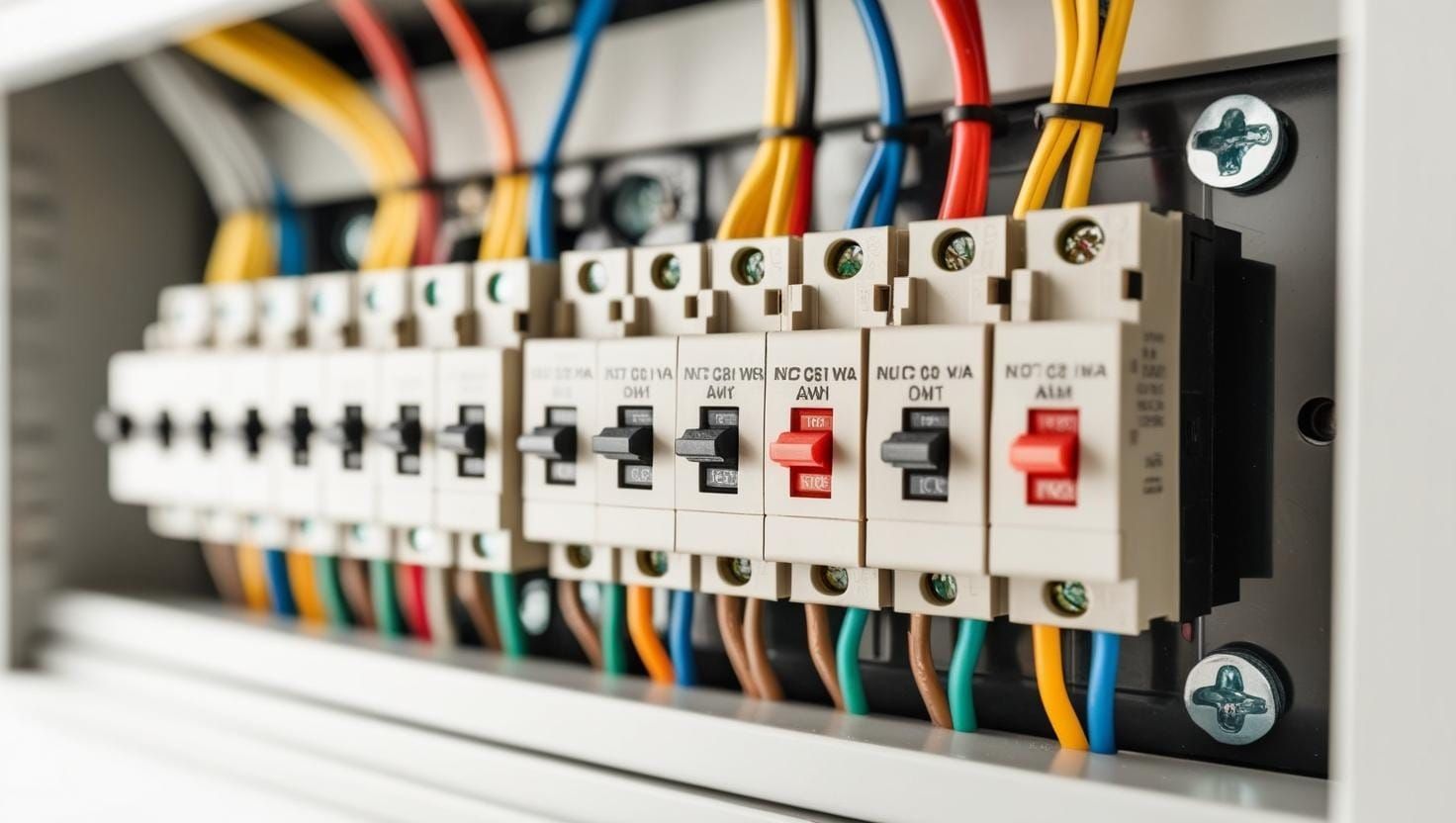
Importance of Hiring a Professional Electrician in Emergencies
Electrical emergencies require professional attention due to the complexity and potential hazards involved. Attempting to fix an electrical issue yourself can lead to further damage, personal injury, or even fires. In these cases, it is crucial to rely on ZA Electrical, serving Sussex and Brighton, to handle these emergencies with expert care.
Why choose ZA Electrical for emergency services?
- Certified and Experienced Technicians: Our electricians are fully trained and certified, adhering to the latest safety standards and regulations.
- 24/7 Emergency Services: Electrical emergencies can happen at any time, and we're always ready to assist, day or night.
- Quick Response Times: We understand the urgency of electrical emergencies and strive to provide quick responses to minimise damage and restore safety.
What You Can Expect from ZA Electrical in an Emergency:
- Accurate diagnostics: We assess the situation quickly and identify the root cause of the issue.
- Safe solutions: We ensure that every solution is safe, compliant with regulations, and effective in resolving the emergency.
- Prevention advice: Our electricians will provide you with advice on how to prevent future electrical issues and enhance your safety.
Why Regular Electrical Inspections Are Crucial
While electrical emergencies are unpredictable, regular inspections can help prevent many of them. By hiring a professional electrician for periodic checks, you can ensure that your electrical systems are running smoothly and safely.
What is included in a regular electrical inspection?
- Wiring and outlets: We check for signs of wear and tear, corrosion, or damage that could pose a risk.
- Circuit breakers and electrical panels: These components are inspected to ensure they're functioning properly and up to code.
- Electrical appliances: We ensure that your appliances are safe to use and are not contributing to system overloads.
- Grounding and bonding systems: Ensuring that your system is properly grounded helps to prevent electrical shocks and fires.
Benefits of Regular Inspections:
- Early detection of problems: Catching issues early can save you from costly repairs and extensive damage.
- Improved safety: Regular checks ensure that your electrical system meets the latest safety standards, reducing risks.
- Peace of mind: Knowing that your home or business's electrical system is thoroughly inspected and safe allows you to focus on other important matters.
Preparing for Future Electrical Emergencies
While no one can predict when an electrical emergency might occur, being prepared can make a significant difference in how quickly and effectively the situation is handled. Here are some tips on how to prepare for potential electrical emergencies in your home or business.
Create an emergency plan:
- Know the shut-off locations: Familiarise yourself with the main electrical panel and how to turn off the power during an emergency.
- Emergency contact list: Keep a list of emergency contacts, including your electrician, and ensure it is readily accessible.
- Backup power solutions: Consider investing in a backup generator to maintain essential power during long-term outages.
Stock up on emergency supplies:
- Flashlights and batteries: Keep flashlights in every room and ensure they are easily accessible in case of a power outage.
- First aid kit: Electrical shocks and burns may require first aid, so always have a well-stocked kit available.
- Surge protectors: Install surge protectors for sensitive electronics to prevent damage from power surges.
Install safety devices:
- Smoke alarms: Ensure that smoke alarms are properly installed and in working order.
- CO2 detectors: If you use gas-powered generators or appliances, carbon monoxide detectors are essential to keep your family safe.
- Fire extinguishers: Keep a fire extinguisher on hand, especially in areas prone to electrical fires (like the kitchen or near electrical panels).
Understanding Insurance Coverage for Electrical Emergencies
When dealing with electrical emergencies, it is essential to understand your insurance coverage. Electrical issues that lead to damage or destruction may be covered under your homeowner’s or business insurance policy.
Types of coverage to consider:
- Homeowner’s insurance: This typically covers damage caused by electrical fires or power surges, but it is essential to review your policy.
- Business insurance: If you're a business owner, ensure that your insurance covers electrical issues, especially in the event of damage to equipment or property.
- Electrical system warranties: Some electrical work comes with warranties that may cover the cost of repairs in the case of future issues.
What to Do in Case of Electrical Damage:
- Document the damage: Take pictures and make a detailed list of damaged equipment and structures.
- File a claim: Report the issue to your insurance provider and begin the claims process.
- Hire a professional: For the safety of everyone involved, hire a certified electrician to handle repairs.
Conclusion: Trust ZA Electrical to handle your electrical emergencies
Electrical emergencies can occur without warning, but with the right knowledge and professional support, you can manage them safely and effectively. At ZA Electrical, we offer expert emergency services for homeowners and businesses in Sussex and Brighton, ensuring that your electrical systems remain safe and reliable.
Remember: The key to preventing serious electrical problems is regular maintenance, professional installation, and a proactive approach to electrical safety. When emergencies do arise, trust ZA Electrical to be your go-to provider for fast, reliable, and professional solutions.
Facing an electrical emergency, or wanting to prepare for future issues? Get in touch with ZA Electrical for prompt and professional assistance.
